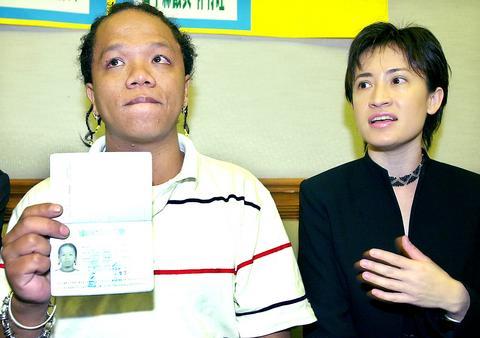In order to allow certain individuals born before 1982 gain Taiwanese citizenship, Democratic Progressive Party (DPP) Legislator Hsiao Bi-khim (蕭美琴) yesterday said she would push for changes in the Nationality Law (國籍法).
Revisions made in 2000 to Article 2 of the law allowed children with one Taiwanese and one foreign parent to obtain Republic of China citizenship, but the revisions only covered people who were children at the time, meaning that the revisions offered nothing to people born before 1982.

PHOTO: LIAO CHEN-HUI, TAIPEI TIMES
Hsiao, who herself is the product of a cross-cultural marriage, said that her wish to revise the law is inspired by the case of George Laverne Jennings, a 28-year old man who, despite having a Taiwanese mother and having lived in Taiwan most of his life, has not been able to obtain Taiwanese citizenship.
Jennings -- or "Little Black," as he is affectionately known to his Taiwanese friends -- is the child of an African-American father and a Taiwanese woman.
He has lived in Taiwan for 19 years and speaks fluent Taiwanese and Chinese. Because his father was American and because he himself was an adult before the law was revised in 2000, Jennings cannot claim Taiwanese citizenship.
Jennings has US citizenship, but is in limbo regarding his status in Taiwan. He does not have a national identity card because he and his mother neglected to fill out forms regarding his stay in the country when he was in high school. Without an identity card, he has been unable to hold a regular job.
At the time that Jennings came to Hsiao's attention, Jennings had overstayed by eight years his legally-sanctioned stay in Taiwan and was facing deportation.
Thanks to the help of local politicians including Hsiao, Jennings has been given an exemption and will be able to stay in Taiwan.
Returning from a brief trip from Hong Kong yesterday, Jennings said that he would begin taking language classes at Feng-chia University.
"I am already a Taiwanese," Jennings said.
"As long as I can get a national identity card, I am even willing to do military service," he said.

Several Chinese Nationalist Party (KMT) officials including Chairman Eric Chu (朱立倫) are to be summoned for questioning and then transferred to prosecutors for holding an illegal assembly in Taipei last night, the Taipei Police said today. Chu and two others hosted an illegal assembly and are to be requested to explain their actions, the Taipei City Police Department's Zhongzheng (中正) First Precinct said, referring to a protest held after Huang Lu Chin-ju (黃呂錦茹), KMT Taipei's chapter director, and several other KMT staffers were questioned for alleged signature forgery in recall petitions against Democratic Progressive Party (DPP) legislators. Taipei prosecutors had filed

Taiwan would welcome the return of Honduras as a diplomatic ally if its next president decides to make such a move, Minister of Foreign Affairs Lin Chia-lung (林佳龍) said yesterday. “Of course, we would welcome Honduras if they want to restore diplomatic ties with Taiwan after their elections,” Lin said at a meeting of the legislature’s Foreign Affairs and National Defense Committee, when asked to comment on statements made by two of the three Honduran presidential candidates during the presidential campaign in the Central American country. Taiwan is paying close attention to the region as a whole in the wake of a

President William Lai (賴清德) has appointed former vice president Chen Chien-jen (陳建仁) to attend the late Pope Francis’ funeral at the Vatican City on Saturday on his behalf, the Ministry of Foreign Affairs said today. The Holy See announced Francis’ funeral would take place on Saturday at 10am in St Peter’s Square. The ministry expressed condolences over Francis’ passing and said that Chen would represent Taiwan at the funeral and offer condolences in person. Taiwan and the Vatican have a long-standing and close diplomatic relationship, the ministry said. Both sides agreed to have Chen represent Taiwan at the funeral, given his Catholic identity and

NEW WORLD: Taiwan is pursuing innovative approaches to international relations through economics, trade and values-based diplomacy, the foreign minister said Taiwan would implement a “three-chain strategy” that promotes democratic values in response to US tariffs, Minister of Foreign Affairs Lin Chia-lung (林佳龍) said. Taiwan would aim to create a “global democratic value chain,” seek to capitalize on its position within the first island chain and promote a “non-red supply chain,” Lin was quoted as saying in the ministry’s written report to the Legislative Yuan submitted ahead of the legislature’s Foreign Affairs and National Defense Committee meeting slated for today. The Ministry would also uphold a spirit of mutual beneficial collaboration, maintaining close communication and consultations with Washington to show that Taiwan-US cooperation